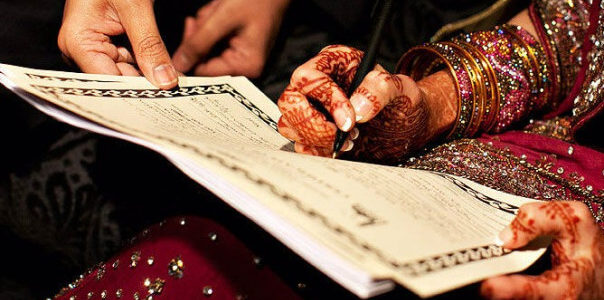6th October 2020
السلام عليكم و رحمة الله و بركاته
Question: If a man with children from a previous marriage marries another woman, who also has children from a previous marriage, would he be his step daughter’s mahram?
Also, would his baligh boys be mahram to his new wife?
Will it be permissible for the man’s children to marry his wife’s children also?
الجواب حامداً و مصلياً
In the name of Allāh, the Most Gracious, the Most Merciful
Answer:
In reference to your query, if the stepfather consummated the marriage with his new wife, then he would now be regarded as a mahram to his wife’s daughter. However, if the marriage was not consummated then he will not be a mahram to his wife’s daughter, and permitted to marry her after divorcing his new wife instantly after the Nikah.[1] The ruling however is different regarding his baligh boys in relation to his new wife. If the marriage between their dad and his new wife has not been consummated, then the male children still becomes a mahram to the new wife. Merely doing the nikah will make them a mahram to her.[2] As the children of each partner have no blood connection between them because they have different biological parents, they will be allowed to marry each other.[3]
[Allāh Knows Best]
Written by: Apa Sajeda Reviewed by: Mufti Abdul Waheed
Attested by: Shaykh Mufti Saiful Islam
JKN Fatawa Department
[1]Al Quraan, Surah Nisaa, Aayat 23
حُرِّمَتْ عَلَيْكُمْ أُمَّهَاتُكُمْ وَبَنَاتُكُمْ وَأَخَوَاتُكُمْ وَعَمَّاتُكُمْ وَخَالَاتُكُمْ وَبَنَاتُ الْأَخِ وَبَنَاتُ الْأُخْتِ وَأُمَّهَاتُكُمُ اللَّاتِي أَرْضَعْنَكُمْ وَأَخَوَاتُكُم مِّنَ الرَّضَاعَةِ وَأُمَّهَاتُ نِسَائِكُمْ وَرَبَائِبُكُمُ اللَّاتِي فِي حُجُورِكُم مِّن نِّسَائِكُمُ اللَّاتِي دَخَلْتُم بِهِنَّ فَإِن لَّمْ تَكُونُوا دَخَلْتُم بِهِنَّ فَلَا جُنَاحَ عَلَيْكُمْ وَحَلَائِلُ أَبْنَائِكُمُ الَّذِينَ مِنْ أَصْلَابِكُمْ وَأَن تَجْمَعُوا بَيْنَ الْأُخْتَيْنِ إِلَّا مَا قَدْ سَلَفَ ۗ إِنَّ اللَّهَ كَانَ غَفُورًا رَّحِيمًا
Imam Qurtubi, Tafseer qurtubi. Vol 5. Pg. 106
(وَلا تَنْكِحُوا مَا نَكَحَ آباؤُكُمْ). قَالَ الطَّحَاوِيُّ: وَكُلُّ هَذَا مِنَ الْمُحْكَمِ الْمُتَّفَقِ عَلَيْهِ، وَغَيْرُ جَائِزٍ نِكَاحُ وَاحِدَةٍ مِنْهُنَّ بِإِجْمَاعٍ إِلَّا أُمَّهَاتِ النِّسَاءِ اللَّوَاتِي لَمْ يَدْخُلْ بِهِنَّ أَزْوَاجُهُنَّ، فَإِنَّ جُمْهُورَ السَّلَفِ ذَهَبُوا إِلَى أَنَّ الْأُمَّ تَحْرُمُ بِالْعَقْدِ عَلَى الِابْنَةِ، وَلَا تَحْرُمُ الِابْنَةُ إِلَّا بِالدُّخُولِ بِالْأُمِّ، وبهذا قول جمعي أَئِمَّةِ الْفَتْوَى بِالْأَمْصَارِ. وَقَالَتْ طَائِفَةٌ مِنَ السَّلَفِ: الْأُمُّ وَالرَّبِيبَةُ سَوَاءٌ، لَا تَحْرُمُ مِنْهُمَا وَاحِدَةٌ إِلَّا بِالدُّخُولِ بِالْأُخْرَى
وَرَبائِبُكُمُ اللَّاتِي فِي حُجُورِكُمْ مِنْ نِسائِكُمُ اللَّاتِي دَخَلْتُمْ بِهِنَّ). وَزَعَمُوا أَنَّ شَرْطَ الدُّخُولِ رَاجِعٌ إِلَى الْأُمَّهَاتِ وَالرَّبَائِبِ جَمِيعًا، رَوَاهُ خِلَاسٌ «٢» عَنْ عَلِيِّ بْنِ أَبِي طَالِبٍ. وَرُوِيَ عَنِ ابْنِ عَبَّاسٍ وَجَابِرٍ وزيد ابن ثَابِتٍ، وَهُوَ قَوْلُ ابْنِ الزُّبَيْرِ وَمُجَاهِدٍ. قَالَ مُجَاهِدٌ: الدُّخُولُ مُرَادٌ فِي النَّازِلَتَيْنِ، وَقَوْلُ الْجُمْهُورِ مُخَالِفٌ لِهَذَا وَعَلَيْهِ الْحُكْمُ وَالْفُتْيَا
Allamah Kasani, Badai’a Sana’ia, Kitabun Nikah, Baab almuharramat bilmusaharat…, Vol 2. Pg. 259-260
وَأَمَّا الْفِرْقَةُ الثَّانِيَةُ: فَبِنْتُ الزَّوْجَةِ وَبَنَاتُهَا وَبَنَاتُ بَنَاتِهَا وَبَنِيهَا وَإِنْ سَفَلْنَ.
أَمَّا بِنْتُ زَوْجَتِهِ فَتُحَرَّمُ عَلَيْهِ بِنَصِّ الْكِتَابِ الْعَزِيزِ إذَا كَانَ دَخَلَ بِزَوْجَتِهِ فَإِنْ لَمْ يَكُنْ دَخَلَ بِهَا فَلَا تُحَرَّمُ لِقَوْلِهِ: {وَرَبَائِبُكُمُ اللاتِي فِي حُجُورِكُمْ مِنْ نِسَائِكُمُ اللاتِي دَخَلْتُمْ بِهِنَّ فَإِنْ لَمْ تَكُونُوا دَخَلْتُمْ بِهِنَّ فَلا جُنَاحَ عَلَيْكُمْ} [النساء: ٢٣] وَسَوَاءٌ كَانَتْ بِنْتُ زَوْجَتِهِ فِي حِجْرِهِ أَوْ لَا عِنْدَ عَامَّةِ الْعُلَمَاءِ
وَأَمَّا الْفِرْقَةُ الرَّابِعَةُ فَمَنْكُوحَةُ الْأَبِ وَأَجْدَادِهِ مِنْ قِبَلِ أَبِيهِ وَإِنْ عَلَوْا،.
Inaya. Kitabun Nikah, Fasl fi bayaanil muharamaat.., . Vol 3. Pg. 310
وَتَحْرُمُ بِنْتُ امْرَأَتِهِ الَّتِي دَخَلَ بِهَا لِثُبُوتِ قَيْدِ الدُّخُولِ بِالنَّصِّ وَهُوَ قَوْله تَعَالَى {مِنْ نِسَائِكُمُ اللاتِي دَخَلْتُمْ بِهِنَّ} [النساء: ٢٣] وَلَيْسَ كَوْنُهَا فِي الْحِجْرِ شَرْطًا. (قَالَ الْمُصَنِّفُ لِأَنَّ ذِكْرَ الْحِجْرِ) يَعْنِي فِي قَوْله تَعَالَى {وَرَبَائِبُكُمُ اللاتِي فِي حُجُورِكُمْ} [النساء: ٢٣] (خَرَجَ مَخْرَجَ الْعَادَةِ) فَإِنَّ الْعَادَةَ أَنْ تَكُونَ الْبَنَاتُ فِي حِجْرِ زَوْجِ أُمِّهَا غَالِبًا: أَيْ فِي تَرْبِيَتِهَا لَا عَلَى وَجْهِ الشَّرْطِ
Allamah Ibn Abideen, Radul Muhtaar, Kitabun Nikah, Fasl fil Muharamaat, Vol 3. Pg. 30
قَوْلُهُ: بِنْتُ زَوْجَتِهِ الْمَوْطُوءَةِ) أَيْ سَوَاءٌ كَانَتْ فِي حِجْرِهِ أَيْ كَنَفِهِ وَنَفَقَتِهِ أَوْ لَا، ذِكْرُ الْحِجْرِ فِي الْآيَةِ خَرَجَ مَخْرَجَ الْعَادَةِ أَوْ ذُكِرَ لِلتَّشْنِيعِ عَلَيْهِمْ كَمَا فِي الْبَحْرِ. وَاحْتَرَزَ بِالْمَوْطُوءَةِ عَنْ غَيْرِهَا، فَلَا تَحْرُمُ بِنْتُهَا بِمُجَرَّدِ الْعَقْدِ وَفِي ح عَنْ الْهِنْدِيَّةِ أَنَّ الْحُلْوَةَ بِالزَّوْجَةِ لَا تَقُومُ مَقَامَ الْوَطْءِ فِي تَحْرِيمِ بِنْتِهَا. اهـ
Hindiyya, Kitabun Nikah, Fasl fil Muharamaat., vol 1, pg. 274
وَالثَّانِيَةُ) بَنَاتُ الزَّوْجَةِ وَبَنَاتُ أَوْلَادِهَا وَإِنْ سَفَلْنَ بِشَرْطِ الدُّخُولِ بِالْأُمِّ، كَذَا فِي الْحَاوِي الْقُدْسِيِّ سَوَاءٌ كَانَتْ الِابْنَةُ فِي حِجْرِهِ أَوْ لَمْ تَكُنْ، كَذَا فِي شَرْحِ الْجَامِعِ الصَّغِيرِ لِقَاضِي خَانْ. وَأَصْحَابُنَا مَا أَقَامُوا الْخَلْوَةَ مَقَامَ الْوَطْءِ فِي حُرْمَةِ الْبَنَاتِ هَكَذَا فِي الذَّخِيرَةِ فِي نَوْعِ مَا يُسْتَحَقُّ بِهِ جَمِيعُ الْمَهْرِ
[2] Allamah Kasani, Badai’a Sana’ia, Kitabun Nikah, Baab almuharramat bilmusaharat…, Vol 2. Pg. 259-260
[فَصْلٌ الْمُحَرَّمَاتُ بِالْمُصَاهَرَةِ فَمَنْكُوحَةُ الْأَبِ وَأَجْدَادِهِ وَإِنْ عَلَوْا]
(فَصْلٌ) :
وَأَمَّا الْفِرْقَةُ الرَّابِعَةُ فَمَنْكُوحَةُ الْأَبِ وَأَجْدَادِهِ مِنْ قِبَلِ أَبِيهِ وَإِنْ عَلَوْا،.
أَمَّا مَنْكُوحَةُ الْأَبِ: فَتُحَرَّمُ بِالنَّصِّ وَهُوَ قَوْلُهُ: {وَلا تَنْكِحُوا مَا نَكَحَ آبَاؤُكُمْ مِنَ النِّسَاءِ} [النساء: ٢٢] وَالنِّكَاحُ يُذْكَرُ وَيُرَادُ بِهِ الْعَقْدُ وَسَوَاءٌ كَانَ الْأَبُ دَخَلَ بِهَا أَوْ لَا؛ لِأَنَّ اسْمَ النِّكَاحِ يَقَعُ عَلَى الْعَقْدِ وَالْوَطْءِ فَتُحَرَّمُ بِكُلِّ وَاحِدٍ مِنْهُمَا عَلَى مَا نَذْكُرُ؛ وَلِأَنَّ نِكَاحَ مَنْكُوحَةِ الْأَبِ يُفْضِي إلَى قَطِيعَةِ الرَّحِمِ؛ لِأَنَّهُ إذَا فَارَقَهَا أَبُوهُ لَعَلَّهُ يَنْدَمُ فَيُرِيدُ أَنْ يُعِيدَهَا فَإِذَا نَكَحَهَا الِابْنُ أَوْحَشَهُ ذَلِكَ وَأَوْرَثَ الضَّغِينَةَ، وَذَلِكَ سَبَبُ التَّبَاعُدِ بَيْنَهُمَا وَهُوَ تَفْسِيرُ قَطِيعَةِ الرَّحِمِ وَقَطْعُ الرَّحِمِ حَرَامٌ فَكَانَ النِّكَاحُ سِرَّ سَبَبِ الْحَرَامِ وَأَنَّهُ تَنَاقُضٌ فَيُحَرَّمُ دَفْعًا لِلتَّنَاقُضِ الَّذِي هُوَ أَثَرُ السَّفَهِ وَالْجَهْلِ جَلَّ اللَّهُ تَعَالَى عَنْهُمَا
Allamah Ibn Abideen, Radul Muhtaar, Kitabun Nikah, Fasl fil Muharamaat, Vol 3. Pg.30
(وَ) حَرَّمَ الْمُصَاهَرَةُ ……..(وَزَوْجَةَ أَصْلِهِ وَفَرْعِهِ مُطْلَقًا) وَلَوْ بَعِيدًا دَخَلَ بِهَا أَوْ لَا
قَوْلُهُ: وَزَوْجَةُ أَصْلِهِ وَفَرْعِهِ) لِقَوْلِهِ تَعَالَى {وَلا تَنْكِحُوا مَا نَكَحَ آبَاؤُكُمْ} [النساء: 22]
.
[3] Hindiyya, Kitabun Nikah, Fasl fil Muharamaat, vol 1, pg 277
لَا بَأْسَ بِأَنْ يَتَزَوَّجَ الرَّجُلُ امْرَأَةً وَيَتَزَوَّجَ ابْنُهُ ابْنَتَهَا أَوْ أُمَّهَا
Allamah Ibn Abideen, Radul Muhtaar, Kitabun Nikah, Fasl fil Muharamaat, Vol 3. Pg.30- 31
حَرَّمَ الْمُصَاهَرَةُ (بِنْتَ زَوْجَتِهِ الْمَوْطُوءَةِ وَأُمَّ زَوْجَتِهِ) وَجَدَّاتِهَا مُطْلَقًا بِمُجَرَّدِ الْعَقْدِ الصَّحِيحِ (وَإِنْ لَمْ تُوطَأْ) الزَّوْجَة لِمَا تَقَرَّرَ أَنَّ وَطْءَ الْأُمَّهَاتِ يُحَرِّمُ الْبَنَاتِ وَنِكَاحَ الْبَنَاتِ يُحَرِّمُ الْأُمَّهَاتِ، وَيَدْخُلُ بَنَاتُ الرَّبِيبَةِ وَالرَّبِيبِ. وَفِي الْكَشَّافِ وَاللَّمْسُ وَنَحْوُهُ كَالدُّخُولِ عِنْدَ أَبِي حَنِيفَةَ وَأَقَرَّهُ الْمُصَنِّفُ (وَزَوْجَةَ أَصْلِهِ وَفَرْعِهِ مُطْلَقًا) وَلَوْ بَعِيدًا دَخَلَ بِهَا أَوْ لَا. وَأَمَّا بِنْتُ زَوْجَةِ أَبِيهِ أَوْ ابْنُهُ فَحَلَالٌ (وَ) حَرُمَ (الْكُلُّ) مِمَّا مَرَّ تَحْرِيمُهُ نَسَبًا، وَمُصَاهَرَةً (رَضَاعًا) إلَّا مَا اُسْتُثْنِيَ فِي بَابِهِ. .
قَوْلُهُ: وَأَمَّا بِنْتُ زَوْجَةِ أَبِيهِ أَوْ ابْنِهِ فَحَلَالٌ) وَكَذَا بِنْتُ ابْنِهَا بَحْرٌ.
قَالَ الْخَيْرُ الرَّمْلِيُّ: وَلَا تَحْرُمُ بِنْتُ زَوْجِ الْأُمِّ وَلَا أُمُّهُ وَلَا أُمُّ زَوْجَةِ الْأَبِ وَلَا بِنْتُهَا وَلَا أُمُّ زَوْجَةِ الِابْنِ وَلَا بِنْتُهَا وَلَا زَوْجَةُ الرَّبِيبِ وَلَا زَوْجَةُ الرَّابِّ
Ibn Nujaym, Al-Bahr Raiq, Kitabun Nikah, Fasl fil Muharamaat, vol 3, pg. 100
فَلَا تَحْرُمُ بِنْتُ زَوْجَةِ الِابْنِ وَلَا بِنْتُ ابْنِ زَوْجَةِ الِابْنِ وَلَا بِنْتُ زَوْجَةِ الْأَبِ وَلَا بِنْتُ ابْنِ زَوْجَةِ الْأَبِ





